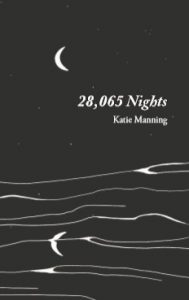 Review by Sarah W. Bartlett
Review by Sarah W. Bartlett
,
Katie Manning’s website bio starts with “Upon first seeing a rhinoceros at the zoo at age 2, I said to my mom, ‘I want to be one of those when I grow up!’ I have settled for being a poet.” Author of five chapbooks and one full-length poetry collection, as well as multiple award-winner and founder/editor-in-chief of Whale Road Review, she has conclusively done more than ‘settle.’
Her poetry resonates at a gut level, as much for its content as for its simple, unadorned, straight from the heart language. While I have yet to enjoy any of her other work, this one pulled me in from the first poem and didn’t let go even beyond the last. With almost child-like simplicity, she has shared a kaleidoscope of tender and intimate details – Granny’s nose on her young son; Granny’s panties and her blue socks; the worn out slippers by her side in the coffin – the immediacy and poignancy of the everyday, made sacred by being named and held, honored and celebrated.
By focusing on details of Granny’s life rather than the poet’s own feelings about her, Manning lifts Granny right off the page into living three-dimensional reality. She is a bit of a rebel in “How to Use Vanilla” – “two drops if Daddy disapproved of him” and “the thrill of a field boy’s rough palm” (3). Yet she is also sensitive and discrete in later years. In “The Last Time I Saw you Alive,” Granny takes care to consider the poet’s feelings even as she apologizes for failing to inquire after her.
Speaking of “The Last Time I Saw you Alive,” Manning’s use of repeating lines turns the poem into a kind of prayer. Including its use as the poem’s title, the line “the last time I saw you alive” is repeated five times (5). The poet uses this same device in other poems to equally strong effect. In “How I Measure your Body,” the repeated use of “Your body …” to start all the lines in the first stanza creates a momentum which, by the final stanza brings us to a standstill with “Your body failed you and became a body or the body, no longer possessed” (10). The rhythm and pacing of the poem carries us along on the unstated but ever-present experience of loss as life ebbs away.
The repetitions of the first poem, “Your Death Explained in Birds” are equally effective; but here, the repetitions are “Death is … I am …. I am …”. This short poem is one of the most powerful I have ever read in its weaving of motherhood and death, the poet speaking as both mother and child in the face of such devastating loss. The silence of helplessness, and its attendant pain. All packed into a few short lines. The kind of poem that leaves the reader both breathless and wishing she had written these captivating (and devastating) words.
The child is as central to this collection as the adult. Not only does the poet include her son in several of the poems, including “The First Day of our Second Year Without You” when son Elliott says when I am really, really old I will go to heaven (2). I especially love the detail of his loving pink sparkly sunglasses – something I noted in my own grandson at three. And then we also are offered Manning’s own child voice in “Twenty Years Before You Died” when she bargains for a place in heaven for her Granny (19). Such weaving of perspectives and themes makes of the collection one unified whole story.
And story it is, composed of layers of small stories, moments filled with love, gratitude, awareness, tender humor – in a word, the contents of a life. In “I was Afraid it Would be Empty,” she worries that the diary she gave Granny will have no stories for her to relive. And yet she already holds them all in her heart. As she says, “You are one of the few people I can – could – sit with for hours on a couch, TV off, only our stories between us” (6).
Thanks to Manning, we now ALL have these stories between us, to remind us of what really matters. Moments, shared.
28,065 Nights by Katie Manning
River Glass Books, September 2020; Paper, 24pp, $7
ISBN
Sarah W. Bartlett, author of two chapbooks with Finishing Line Press (Slow Blooming Gratitudes, 2017; and Into the Great Blue, 2011) has also brought two books into the world from writinginsideVT, her ten-year program with Vermont’s incarcerated women: Life Lines: Re-Writing Lives from Inside Out, Green Writers Press, 2019; and Hear Me, See Me: Incarcerated Women Write, Orbis Books, 2013. Currently retired, she leads poetry groups, volunteers in the community, and continues to publish work celebrating nature’s healing wisdom and the human spirit’s landscapes.
